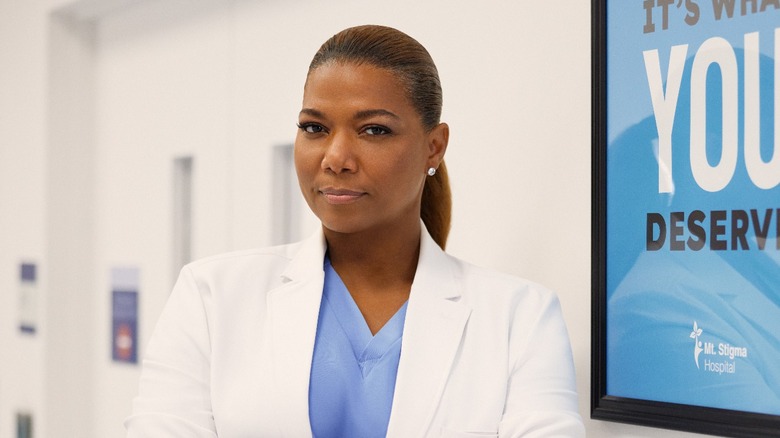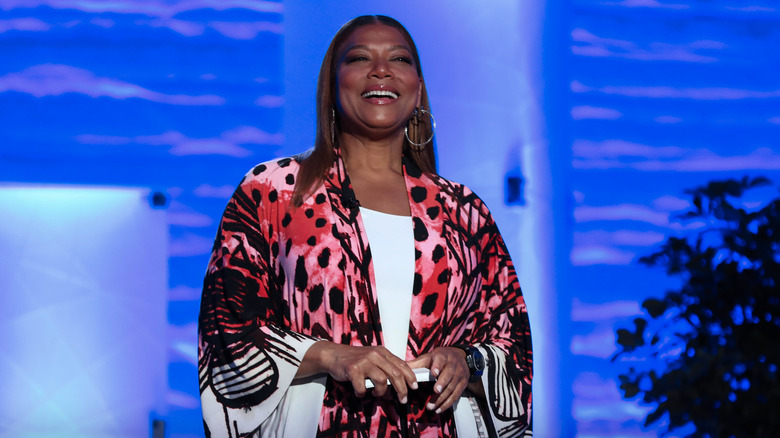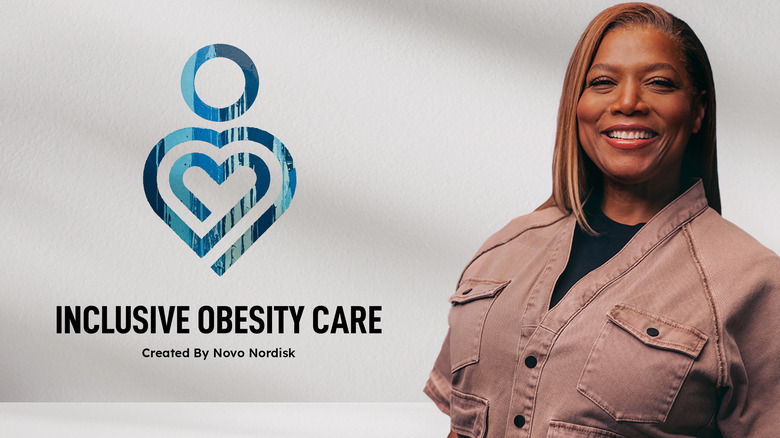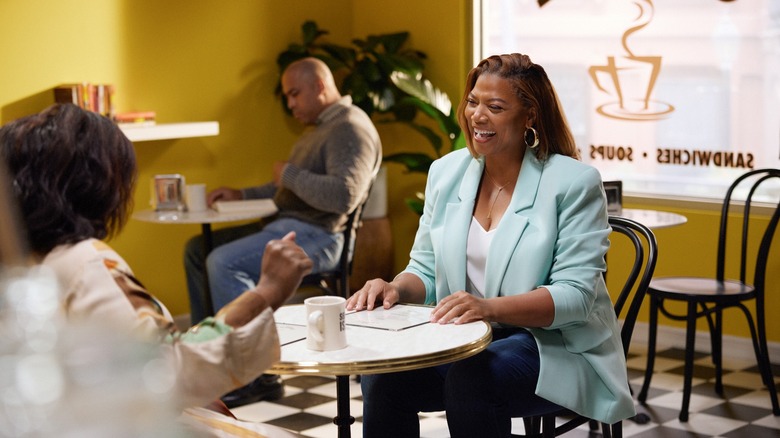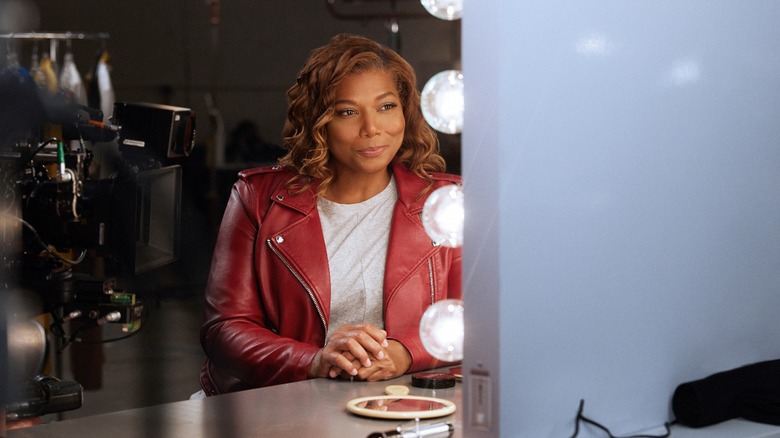Queen Latifah Talks About The Importance Of Body And Gender Inclusivity - Exclusive Interview
According to the CDC, more than 40% of the U.S. population is living with obesity. While generic advice on maintaining a healthy diet and exercise regimen can help some people manage their weight, science shows that treating obesity is much more complicated — with genetics and brain chemistry often playing a role in the condition. Dr. Fatima Cody Stanford, who teaches at Harvard Medical School and practices at the Massachusetts General Hospital Weight Center, says that the idea of "calories in, calories out" is not a one-size-fits-all solution to weight management, and the myths around calorie counting actually contribute to "stigma, blame, and shame," which all further exacerbate the issue. And she's not the only one noting the importance of removing that stigma: A report in the Journal of General Internal Medicine that analyzed weight care management of patients with obesity found that "efforts to enhance a provider's ability to communicate empathy and concern may also result in greater weight loss."
This is why Novo Nordisk has created the It's Bigger Than Me campaign and launched the Inclusive Obesity Care Initiative (IOC) as a part of the campaign. Partnering with Queen Latifah, the initiative hopes to encourage stigma-free discussions between doctors and patients while providing informational resources that dispel common myths surrounding obesity. Doctors can now use the official IOC symbol at their practices to indicate that they offer compassionate, shame-free care. To learn more about the initiative, we spoke exclusively with Queen Latifah, and she told us more about the partnership, the importance of inclusivity, and why she encourages everyone to live as their authentic selves.
Reducing stigma is crucial
What inspired you to collaborate with the It's Bigger Than Me campaign?
The idea that there is a symbol that represents safety, respectfulness, hope, and compassion when you see it is a fantastic idea to me. This was something that came from the It's Bigger Than Me campaign, and I thought it was brilliant. The idea that you can look and see this symbol and know that you're in good hands — or know that someone actually cares and is trying to understand — is what it's all about.
When I learned the statistic that 66% of people living with obesity experience shame or stigma for the first time at their doctor's office, I was like, "That's impossible," but it actually is not. It is actually the case. We work with some wonderful doctors who are leading the change in their own communities and thought that this would be a great way to identify advocates and allies in this sense. It's a cool idea.
How is the It's Bigger Than Me campaign working to change that current narrative and the treatment options that are there for people living with obesity?
First of all, it's creating a community, because this has nothing to do with promoting a drug or selling something. We're only selling community. We're selling connection. We're selling understanding. So many people that I know have come up to me since the very beginning of this campaign a couple years ago when they saw me connected to it and were like, "Is this a real thing? What's going on? Is something happening?" They might be other people that you know. Maybe you don't know them, but you'd be surprised how many people have faced stigma throughout their lives or have faced some shame, or been the butt of a joke, or been encouraged to change themselves in some way to meet some sort of ideal when it's really not them.
In their own circle of friends, it may be easy for someone else to change their physical appearance in a healthy way, and it's not as easy for them ... They should be able to go to their doctor and have that honest conversation and not have to worry about facing any shame [or] stigma, knowing that they can be honest and open, and get information and solutions, and be treated appropriately and properly and with some respect and love. To me, that's where it is. No judgment — just a real, honest conversation about what is really going on, because we all deserve healthcare.
Queen Latifah believes compassion is key
Obesity is a growing issue. I was looking at the [campaign's] website, and it said 40% of adults in the U.S. live with obesity. How are we able to manage this condition and the numbers that we're seeing, but still do it in that compassionate way that's not going to trigger any stigma?
It's going to take some time and effort, and a lot of us who recognize it for what it really is — a clinical issue and not some sort of character flaw, some moral thing, or someone being lazy, or all of those quick rush-to-judgment ideas that come out of people's mouths or to people's minds. That should not be the first thought. If you thought about any other disease, you would not think of it in the same way.
You wouldn't say the same things. You would make more space in this world, whether it's making wider seats in an airplane, or on a bus, or in a car, or in a doctor's office. Those are the things that should exist. We're talking about four out of 10 Americans — that's a lot of people. Those are millions and millions and millions of hardworking, tax-paying American people who deserve the same respect as everyone else. Many are kids, children. What example are we setting? What are we showing? We need to do a better job at fighting to change and to make a better future for them — so let's go.
Eating healthy and exercising regularly isn't always enough
There was a quote on the website from you that I really liked: "The idea that people who live with obesity are lazy or lack willpower or self-control — it's so much more complex than that. Yet I see so many comments from people on social media where they say, 'Oh, people dealing with obesity, they should just exercise. They should just eat healthier.'" To those people, can you explain why it's more complicated than eating healthier and working out?
Well, I can't completely explain it — I'm not a doctor. But I can tell you this: It is a medical condition, one that you need medical treatment for. To say, "Okay, I can just jog and jog and jog and everything is going to go away" — that is not the case. People do jog and jog and jog, and it does not go away, because what happens in the body of someone who is living with obesity versus someone who is not are two different things. That's why it's important that it's handled in a medical way and treated as such and thought of as such. All of that doesn't exactly work.
Furthermore, this is what's happening: We don't know what you look like behind that keyboard; we just see the picture you put up. Everybody puts up this best version of themselves online. The truth is, everybody is fighting with something, is dealing with something. Nobody's life is perfect. What I would love to see is some more compassion. "I wish you the best with everything." How about that? Or how about don't say anything at all if you can't say something nice? That's still your option.
Better yet, educate yourself. Go on itsbiggerthan.com, and you can see why it's different and why you should speak a different way, or why there's a different conversation to be had, or why people deserve a judgment-free zone and much more respect than what you may be giving, or why that little comment is not helpful. I'm hoping that's what people do, because we all deserve to live a wonderful life on this planet together. We all have something to offer. But if we hold each other back or we always say things to get in each other's heads in a negative way, all it does is hold everybody back. We need to put much more positivity out there in the world.
Queen Latifah is the ultimate girl's girl
You were recently named as one of the 2023 Black Music and Entertainment Walk of Fame honorees. Reflecting back to the start of your career in music, how does this moment feel?
There's a few big moments that are happening in music that are making me feel amazing. Female rappers are having a huge resurgence in hip hop's 50th year, and that's a beautiful thing to see because it makes all the music better. Unfortunately, we are still dealing with some of the same things that I talked about in my records when I was 18 years old. I wish we didn't have to deal with some of those things now, but it shows how we have to stay diligent. We can still make hot records but bring a message home at the same time — that we should still own our bodies, that women still have to fight for women. We still have to fight for each other. It's always going to be ladies first, as far as I'm concerned, because it starts at home for me. I'm a girl's girl. I root for women.
I hope that we continue to grow in hip hop, and I hope that spreads around the world because the world needs that. I'm proud of what we've been able to accomplish. Hip hop has been ... If it weren't for hip hop, a lot of other forms of music would be blocked a little bit, because we literally had to go to court to make sure that we weren't censored. Because we weren't censored, other forms of music didn't have to be censored. They reaped the benefit of what us little rappers from the hood turned into a global phenomenon. We'll take that.
Queen Latifah stresses the importance of being authentic
I have a loved one who is living with obesity right now, so knowing everything that she has gone through and hearing what you have to say, I'm glad that the medical field is trying to move in the right direction.
That is great to hear. Continue to push this because people need to be aware. They don't always realize or know, and we all have family members or friends — and you'd be surprised who you know. You have no idea, because we change our images so much. When you see pictures of someone when they were younger and they look completely different, you don't know what anyone's been through in their journey. We have to be supportive wherever we can. I'm glad that you feel that zone right there.
I love that you champion being a woman's woman. The one statement that you made recently — it was that you love to wear beautiful dresses and gowns, but you also love to play basketball with the boys, and you're not afraid of a little mud. That's so relatable. We get put into these boxes in society, but we can be multidimensional women.
I find that we are multidimensional nine times out of 10, and I don't think it's us who created the box. If anything, we got to fight to allow ourselves — and everyone, honestly. It's not just us. It's not just a woman thing. Too many men are put in a box, and there's a whole community of non-binary, non-gender. Everybody's being put into categories that they shouldn't be put into because it blocks our freedom of movement and our freedom to be creative and be who we are.
I want everybody to be who they authentically are. Yeah, I do like to play some basketball, and I like to wear a cute dress, and that's how that is.
Visit the websites for the It's Bigger Than Me campaign and the Inclusive Obesity Care Initiative to learn more. You can keep up with Queen Latifah's latest projects on Instagram.
This interview has been edited for clarity.
